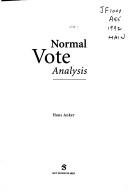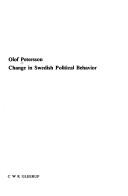| Listing 1 - 10 of 46 | << page >> |
Sort by
|
Book
ISBN: 9780192894137 0192894137 Year: 2023 Publisher: Oxford: Oxford University Press,
Abstract | Keywords | Export | Availability | Bookmark
 Loading...
Loading...Choose an application
- Reference Manager
- EndNote
- RefWorks (Direct export to RefWorks)
In many established democracies, vote choices are growing more volatile over time. This book assesses how changes in voters' decision making process have contributed to this change. The first part of the book examines the evidence for the claim that the increase in volatility results from a shift in weight from long-term to more short-term determinants of the vote choice. This overview and the analyses that are presented highlight the limitations of existing theories of electoral change and call for novel explanations for voter volatility. The second part of the book makes the argument that group-based cross-pressures are an important source of volatility. Such cross-pressures, that results from the fact that citizens' socio-demographic characteristics and group-memberships pull them in different partisan directions, imply voters' decision making process lacks constraint, ultimately making the vote choice more volatile. The book tests this argument by means of longitudinal election survey data from eight established democracies, which allows tracing changes in the vote choice process since the 1950s. The over-time increase in levels of group-based cross-pressures provide a first indication of their importance for explaining over-time changes in voting behaviour. The empirical analyses that are presented next provide more evidence that is in line with this theoretical argument. The results show that group-based cross-pressured voters are less likely to be partisan, are less guided by short-term determinants when choosing a party, make their vote choice later and switch parties more. Analyses that make use of panel survey data confirm these key findings

ISBN: 9073052378 Year: 1992 Publisher: Amsterdam : Het Spinhuis,
Abstract | Keywords | Export | Availability | Bookmark
 Loading...
Loading...Choose an application
- Reference Manager
- EndNote
- RefWorks (Direct export to RefWorks)
Book
ISBN: 9789570831368 9570831367 Year: 2007 Publisher: Taibei Shi : Lian jing chu ban shi ye gu fen you xian gong si,
Abstract | Keywords | Export | Availability | Bookmark
 Loading...
Loading...Choose an application
- Reference Manager
- EndNote
- RefWorks (Direct export to RefWorks)
Elections --- Voting research --- History. --- History.
Book
ISBN: 0465032036 Year: 1985 Publisher: New York (N.Y.) : Basic books,
Abstract | Keywords | Export | Availability | Bookmark
 Loading...
Loading...Choose an application
- Reference Manager
- EndNote
- RefWorks (Direct export to RefWorks)
Democracy. --- Political science. --- Voting research --- Voting

ISBN: 9140040674 9789140040671 Year: 1975 Volume: 5 Publisher: Lund : Gleerup,
Abstract | Keywords | Export | Availability | Bookmark
 Loading...
Loading...Choose an application
- Reference Manager
- EndNote
- RefWorks (Direct export to RefWorks)
Political participation --- Voting research --- Theses --- Political participation - Sweden --- Voting research - Sweden
Book
ISBN: 3631351569 Year: 1999 Publisher: Frankfurt am Main : Lang,
Abstract | Keywords | Export | Availability | Bookmark
 Loading...
Loading...Choose an application
- Reference Manager
- EndNote
- RefWorks (Direct export to RefWorks)
Elections --- Political culture --- Political parties --- Voting research --- Germany.
Book
ISBN: 9782200354251 2200354258 Year: 2018 Publisher: Malakoff Armand Colin
Abstract | Keywords | Export | Availability | Bookmark
 Loading...
Loading...Choose an application
- Reference Manager
- EndNote
- RefWorks (Direct export to RefWorks)
De la discussion politique à la manifestation de rue, du vote à la consommation engagée, de la grève des urnes à celle de l'impôt ou à l'Internet militant, cet ouvrage porte un regard novateur sur une question centrale en démocratie : la "participation" politique. Une participation foisonnante, multiforme, contournant les canaux institutionnels, débordant les frontières de l'Etat nation, mais toujours inégalitaire. Il présente les grands modèles explicatifs et leurs applications concrètes, les auteurs marquants, les concepts clés de la sociologie politique contemporaine, tant française qu'étrangère, ainsi que les principaux débats qui la traversent. S'appuyant sur les grandes enquêtes tant hexagonales (Cevipof) qu'internationales (ESS, Enquêtes valeurs, ISPP) depuis les années 60, l'auteure resitue le cas français dans une perspective historique, comparative et interdisciplinaire. Autant d'atouts qui font de ce livre un outil indispensable pour penser la redéfinition des frontières du politique, et la référence pour aborder la " crise " de la représentation que traversent toutes les démocraties occidentales.
Political participation. --- Voting research. --- Participation politique --- Sociologie électorale --- Political participation --- Voting research --- Sociologie électorale --- Political sociology --- Pratiques politiques --- Sociologie politique
Book
ISBN: 9781108465946 9781108475228 9781108690416 1108465943 1108475221 110867979X 1108683843 1108690416 Year: 2019 Publisher: Cambridge Cambridge University Press
Abstract | Keywords | Export | Availability | Bookmark
 Loading...
Loading...Choose an application
- Reference Manager
- EndNote
- RefWorks (Direct export to RefWorks)
Why do vote-suppression efforts sometimes fail? Why does police repression of demonstrators sometimes turn localized protests into massive, national movements? How do politicians and activists manipulate people's emotions to get them involved? The authors of Why Bother? offer a new theory of why people take part in collective action in politics, and test it in the contexts of voting and protesting. They develop the idea that just as there are costs of participation in politics, there are also costs of abstention - intrinsic and psychological but no less real. That abstention can be psychically costly helps explain real-world patterns that are anomalies for existing theories, such as that sometimes increases in costs of participation are followed by more participation, not less. The book draws on a wealth of survey data, interviews, and experimental results from a range of countries, including the United States, Britain, Brazil, Sweden, and Turkey.
Political participation --- Voter turnout --- Voting --- Voting research --- Protest movements --- Abstention --- Political aspects --- Political sociology --- Political participation. --- Voter turnout. --- Voting research. --- Abstention. --- Political aspects.
Book
ISBN: 9789049618391 9049618391 Year: 2020 Publisher: Genval : Vanden Broele éditions,
Abstract | Keywords | Export | Availability | Bookmark
 Loading...
Loading...Choose an application
- Reference Manager
- EndNote
- RefWorks (Direct export to RefWorks)
Les scrutins communaux du 14 octobre 2018 en Belgique francophone furent organisés dans un contexte de méfiance particulièrement important vis-à-vis des partis politiques traditionnels. Les affaires dites « Publifin » en Wallonie et du « Samusocial » à la ville de Bruxelles – concernant la légalité et la légitimité politique de rémunérations perçues par des mandataires politiques locaux – étaient de nature à déstabiliser l’ancrage local des partis nationaux impliqués. En outre, aux niveaux régional et fédéral, la formation des coalitions à la suite des élections de 2014 donna lieu à des situations inédites. D’une part, le Mouvement Réformateur (MR) figurait comme l’unique parti francophone de la majorité fédérale, en position de « seul contre tous » et essuyant de nombreuses critiques d’une opposition « de gauche ». D’autre part, le centre démocrate humaniste (cdH) en coalition avec le PS à la Région wallonne rejeta son partenaire du gouvernement dans l’opposition durant l’été 2017, et s’allia au MR pour le reste de la législature. Dans ce contexte, les élites politiques traditionnelles implantées au niveau communal allaient-elles être sanctionnées par les électeurs ? Allaient-elles souffrir de la concurrence de nouveaux acteurs politiques se distanciant de la « classe politique » établie, notamment les « listes citoyennes »? En d’autres mots, assisterait-on à une offre politique renouvelée provoquant une transformation des rapports de force au sein de l’espace politique francophone ? Des chercheurs issus de quatre universités belges francophones (UCLouvain, ULB, ULiège et UNamur) ont répondu conjointement à ces questions. Ils analysent l’offre électorale dans les 253 communes francophones de Wallonie et les 19 communes de Bruxelles lors du scrutin du 14 octobre 2018. Au total, 1 195 listes furent analysées. L’ouvrage examine l’impact du contexte politique et institutionnel exposé ci-dessus sur la composition de l’offre électorale (les types de listes et le profil des candidats), sur les stratégies et sur les performances des acteurs politiques (candidats, partis politiques nationaux, listes locales et citoyennes, etc.). Il questionne par ailleurs la nature fondamentalement « locale » des élections communales et leur rapport aux dynamiques politiques nationales et régionales.
Élections locales --- Elections --- Political parties --- Voting research --- Voting --- Belgium --- Politics and government --- Elections - Belgium --- Political parties - Belgium --- Voting research - Belgium --- Voting - Belgium --- Belgium - Politics and government
Book
ISBN: 9781538156766 9781538158357 9781538156773 Year: 2021 Publisher: London ECPR Press/Rowman & Littlefield
Abstract | Keywords | Export | Availability | Bookmark
 Loading...
Loading...Choose an application
- Reference Manager
- EndNote
- RefWorks (Direct export to RefWorks)
"Leaders without Partisans examines the changing impact of party leader evaluations on voters' behavior in parliamentary elections. The decline of traditional social cleavages, the pervasive mediatization of the political scene, and the media's growing tendency to portray politics in "personalistic" terms all led to the hypothesis that leaders matter more for the way individuals vote and, often, the way elections turn out. This study offers the most comprehensive longitudinal assessment of this hypothesis so far. The authors develop a composite theoretical framework - based on currently disconnected strands of research from party, media, and electoral studies - and test it empirically on the most encompassing set of national election study datasets ever assembled. The labor-intensive harmonization effort produces an unprecedented dataset pooling information for a total of 129 parliamentary elections conducted between 1961 and 2018 in 14 West European countries. The book provides evidence of the longitudinal growth in leader effects on vote choice and on turnout. The process of partisan dealignment and changes in the structure of mass communication in Western societies are identified as the main drivers of personalization in voting behavior"--
Personality and politics --- Political leadership --- Political parties --- Voting research --- Political sociology
| Listing 1 - 10 of 46 | << page >> |
Sort by
|

 Search
Search Feedback
Feedback About UniCat
About UniCat  Help
Help News
News